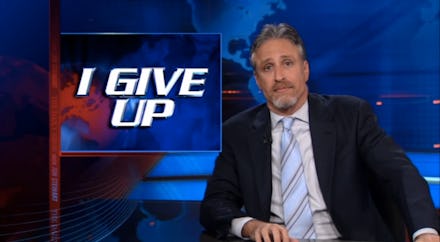Five Times Jon Stewart Stopped Being Funny and Started Being Real

When Jon Stewart takes his final bow Thursday night after 16 years as host of The Daily Show, many will remember him as a brilliant comedian who gleefully skewered the regular absurdities of business, politics and media. Future students of satire and media criticism will watch and perhaps study memorable takedowns of Fox News bugaboo Glenn Beck or former Alaska governor and Republican vice presidential candidate Sarah Palin.
But the comedian was often at his best when he wasn't telling joke, but rather speaking up, without humor, as a voice for the times. When Stewart had that look which said "no jokes today," you knew it was bad. It was rare, but when the no-nonsense realness happened, everyone knew to pay attention.
Below are five of those moments.
1. The Sept. 11 terrorist attacks
The first inklings that Stewart was more than just a comedian became apparent on the host's first show after the terrorist attacks of Sept. 11, 2001. Off the air for nine days as the nation reeled, Stewart used his Sept. 20 appearance to publicly grieve for the nearly 3,000 victims of the tragedy. Choking up at various times, the Daily Show host invoked one of his earliest memories, the assassination of Martin Luther King Jr. in 1968. Stewart said that in the aftermath of the attack, he had seen the spirit of King's dream — people coming together without prejudice to one help another — come alive. For that reason, said Stewart, he did not despair.
"It's light, it's democracy," he said. "They can't shut that down."
2. The Zadroga Act
Nine years after he delivered his 9/11 monologue, Stewart addressed the subject again on a 2010 show that focused on the James Zadroga Act. The act would have guaranteed health care coverage to 9/11 first responders suffering from ailments as a result of their service. To pay for the law, Democrats proposed closing a tax loophole on overseas corporate profits. In a segment called "I Give Up," which showed intransigent Republicans decrying "tax increases," Stewart repeatedly exclaimed how angry the issue made him. Far from giving up, however, his consistent and relentless advocacy of the issue, including on-set interviews with actual first responders, is credited with shaming Republicans into lifting their objections. President Barack Obama signed the Zadroga Act on Jan. 2, 2011.
3. Eric Garner
Few issues could stir up Stewart quite like race, and he was in top form in a year that seemingly saw one unarmed black person killed by police after another. Stewart saved particular ire for Eric Garner, and specifically, the jury that declined to indict his killer, former New York Police Department officer Daniel Pantaleo.
"If comedy is tragedy plus time, I need more fucking time. But I would really settle for less fucking tragedy," said a visibly depressed Stewart. The Daily Show host said that if video footage of Pantaleo choking Garner to death was not enough to secure a trial, it called into question the entire premise of police body cameras.
4. Charleston
On his broadcast after a massacre in Charleston, South Carolina, left nine dead in a historically black church, Stewart offered arguably his most stone-faced monologue since 9/11. Far from the hopeful overtones he expressed after that terrorist attack, his response now was heavy with despair. Stewart noted the painful incongruence of a country that fought wars and bombed nations to protect the safety of its people from foreign terrorism, but blithely shrugged off equally horrific acts of domestic terrorism.
5. Crossfire
Stewart didn't just save his wrath for those foolish enough to come to him, like Jim Cramer and Chris Matthews. The comedian was not shy about dropping hard truths anywhere he went — even if it was a show he had been invited on as a guest. In 2005, Stewart appeared on Crossfire, a political debate show on CNN. Over a devastating 14 minutes, he dismembered the show, dissecting and parsing all the reasons he felt it was destructive and should not exist. Stewart implored hosts Tucker Carlson and Paul Begala to "stop hurting America," while his frustrated interlocutors begged him with increasing desperation to "be funny."
Not long after, Crossfire was history.